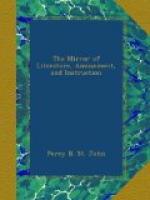Duke.—The fruits of which these beverages are composed, come from another world, and from the Gulf of Arabia.
Tullia.—Arabia I remember; but never heard mention made of what you call coffee; and as for another world, I know only of that from whence I came, and do assure you, we have no chocolate there.
Duke.—The world of which we tell you, madam, is a continent, called America, almost as large as Europe, Asia, and Africa, put together; and of which we have a knowledge less vague, than of the world from whence you came.
Tullia.—What! Did we then, who styled ourselves masters of the world, possess only half of it? The reflection is truly humiliating!
The Savant.—(piqued that Tullia had pronounced his verses bad, replies dryly:) Yes, your countrymen who boasted of having made themselves masters of the world, had scarce conquered the twentieth part of it. We have at this moment, at the further end of Europe, an empire larger in itself than the Roman:[5] it is governed, too, by a woman, who excels you in intellect and beauty, and who wears chemises; had she read my verses, I am certain she would have thought them good.
(The Marchioness commands silence on the part of the author, who has treated a Roman lady, the daughter of Cicero, with disrespect. The duke explains the discovery of America, and taking out his watch, to which is appended, by way of trinket, a small mariner’s compass, shows her how, by means of a needle, another hemisphere is reached. The amazement of the fair Roman redoubles at every word which she hears, and every thing she beholds; and she at length exclaims:)
Tullia.—I begin to fear that the moderns really do surpass the ancients; on this point I came to satisfy myself, and doubt not I shall have to carry back a melancholy report to my father.
Duke.—Console yourself, madam, no man amongst us equals your illustrious sire; neither does any come near Caesar, with whom you were contemporary, nor the Scipios who preceded him. Nature, it is true creates, even at this day, powerful intellects, but they resemble rare seeds, which cannot arrive at maturity in an uncongenial soil. The simile does not hold good respecting arts and sciences; time, and fortunate chances, have perfected them. It would, for example, be easier for us to produce a Sophocles, or an Euripides, than such individuals as your father, because, theatres we have, but no tribunals for public harangues.[6] You have hissed the tragedy of Cataline; when you shall see Phaedrus played, you will probably agree that the part of Phaedrus, in Racine, is infinitely superior to the model you have known in Euripides. I hope, also, that you will agree our Moliere surpasses your Terence. By your permission, I shall have the honour of escorting you to the opera, where you will be astonished to hear song in parts; that again is an art unknown to you.[7] Here, madam, is a small telescope, have the goodness to apply your eye to this glass, and look at that house which is a league off.




